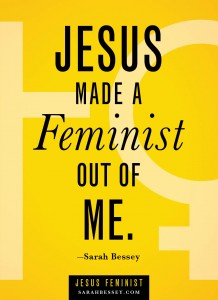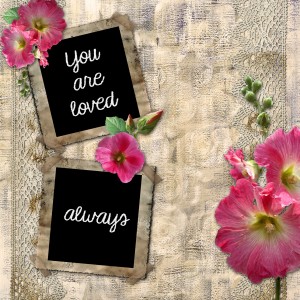I remember coming home from a conference on cross-gender friendship a couple years ago, and calling one of my best friends from college. “How’d it go?” she asked.
“It was awesome. I learned a lot… oh, and I think I’m an egalitarian feminist.”
She started laughing.
“No, really. I think I’ve been one for awhile, actually. I just didn’t realize it.”
More laughter. When she could breathe again, she said something to the effect of: “Hap, do you have any idea what your eighteen-year-old self would say if you could go back in time and tell her you’d become an egalitarian feminist?”
I smiled wryly. “Yeah… I would have thought she was nuts.”
True story. I won’t touch the complementarian/egalitarian shift right now – that’s a whole different story. But feminism… oh, my. In retrospect, I can see now that I didn’t have the slightest clue what being a feminist even meant – but in my ignorance, I feared Christian feminism as “too liberal” (read: “dangerous theological ground”) – and therefore, not for me.
So it did surprise me a little to discover I’d become a feminist. And I am still figuring out what that means for me – philosophically, theologically, and practically. But something has shifted in the way I think and feel about myself, and about feminism in general, and it does not feel very dangerous at all. It feels… free.
The only thing that feels dangerous is saying I’m a feminist. Because there are a lot of different kinds of feminism – characterized by a broad spectrum of ideologies – some of which I agree with, and some of which I don’t. Also, historically, feminism tends to get associated with other things. (For example, throughout American history, feminist movements have been been tied to the abolition of slavery, temperance, and more recently, gay rights.)
So I feel like if I’m going to say I’m a feminist, I need to define what I mean by it, lest people hear me say something I’m not saying.
 But before I can even begin to explain what I mean when I say I’m a feminist, I need to explain how and why I became a feminist.
But before I can even begin to explain what I mean when I say I’m a feminist, I need to explain how and why I became a feminist.
I think Sarah Bessey said it well in her book, Jesus Feminist, when she said: “Jesus made a feminist out of me.”
That’s how it was for me, too.
I’ve been reading the Bible for more than half my life, and its words weave in and out of my thoughts daily, whether I am consciously choosing to think about them or not. And over the years, I’ve started to notice something: every interaction recorded in Scripture between Jesus and women demonstrates value.
So I started reading books like Sarah Bessy’s Jesus Feminist, Rachel Held Evans’ A Year of Biblical Womanhood, and Danny Silk’s Powerful and Free (and others like them), and learning as much as I could concerning the culture and thought of the societies about which the Bible is written, and the radical counter-cultural ways of Jesus. It wasn’t culturally normative for Jesus to value women the way He did – to treat them as equals, to allow them the privilege of discipleship. And it wasn’t culturally normative for women to hold leadership positions in their societies, but the rest of the New Testament mentions several women who were leaders in the early church. Even in the Old Testament, the pattern starts to emerge: in the earliest days of Israel, women were being honored and respected and used by God in ways that to the world around them must have seemed strange.
I’m thinking of women like Deborah, Hannah, Huldah, Esther, and the daughters of Zelophehad. Among others.
And later Anna, Mary of Bethany, the woman at the well – among others. Women who in their societies shouldn’t have had a voice. And yet they did, and their stories have been told for generations – stories of how God used them to speak to, save, encourage, and even liberate His people.
It’s not a far leap from His words and His actions to conclude that Jesus was a feminist.
For all the cultural progress of the past 2000+ years, there are still places in this world where women are not viewed as valuable in their own right – where they are enslaved and abused and mistreated and ignored – where the idea that God could possibly have created them with a purpose and a destiny all their own is completely foreign.

photo courtesy of ©Depositphotos.com / aelita; font: KG Makes You Stronger by Kimberly Geswein
And when one of us suffers, we all do. Whether we know it or not.
So someone needs to advocate for them.
And when I read stories like this one, about a woman who legally should have been stoned to death for adultery, and I watch Jesus intervene and forgive and show her the way to restored dignity (“Go, and sin no more…”) – I hear Him whisper to my heart, “Will you do that? Will you advocate for these women who don’t even know that they are made in My image and that they are worthy of love and compassion and mercy and grace? Will you help them? And will you tell them? And will you tell the ones that oppress them, who don’t understand that what they’re doing is wrong, because they do not know Me?”
How could I possibly say no? I don’t know what my “yes” will look like… but for today my “yes” is simply wrestling my way through this blog post to tell my own story (which was harder to explain succinctly than I thought). I suspect that in time it will look like much more than that. But for today…
It’s simply saying, “Yes, I’m a feminist.” Which for me, in a lot of ways, is really just another way of saying, “Lord Jesus, I want to be more like you.”
This site uses Akismet to reduce spam. Learn how your comment data is processed.
The statements made and opinions expressed here are solely those of the authors and do not necessarily reflect the views and opinions of any current or former employers.

Shara
September 5, 2014❤️
Shara
September 5, 2014I’m not sure why my comment didn’t register! I promise I wrote that I loved this post!
I love that there are powerful women in the Bible. I do feel like they are overlooked because of society, back in Jesus’ day and ours, today. I see how so many women have shaped the world, and I can’t help but think that people’s eyes can only open more about how women are beneficial in God’s kingdom in more than a submissive, demure role & backseat role.
Feminism isn’t always what people imagine it to be. Women just attempting to take over. It’s wanting to work hand in hand as equals.
I am glad you are a Jesus Feminist, Hap! He would be proud of who you are! A sweet, gentle & warm soul that is full of His grace & walking in His wisdom!!
Happy
September 5, 2014I’m glad I’m a Jesus Feminist, too, Shara! Thank you so much for your kind and encouraging words. 🙂
“I can’t help but think that people’s eyes can only open more about how women are beneficial in God’s kingdom in more than a submissive, demure & backseat role.”
Amen.